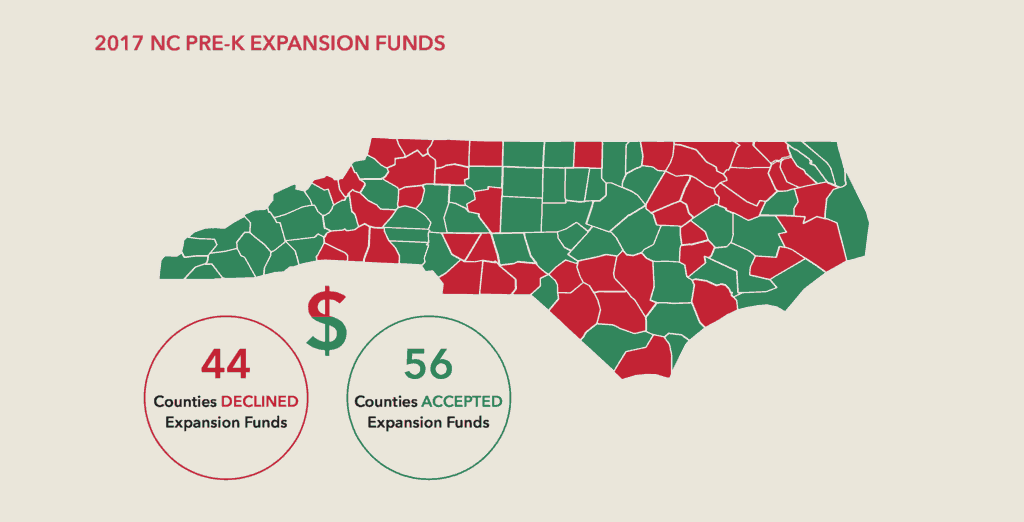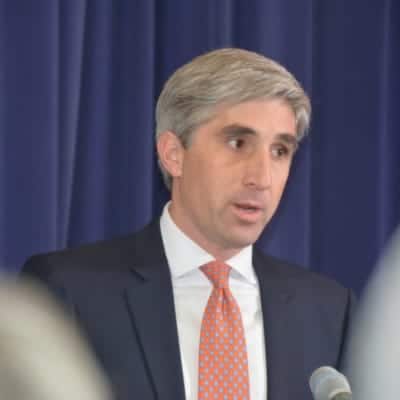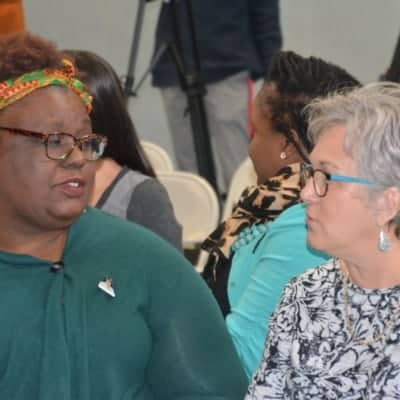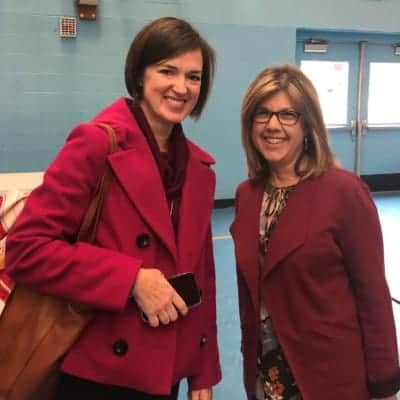A group of North Carolina business people gathered at Millbrook Elementary School yesterday to announce their desire to see 75 percent of eligible children in the state enrolled in NC Pre-K and to suggest ways the state can make that happen, including a revamping of how the program is funded.
Jim Goodnight, Chief Executive Officer and co-founder of SAS, told the crowd assembled for a press conference that business leaders gathered two years ago to implore state lawmakers to increase funding for NC Pre-K. The state did, but Goodnight said that problems arose.
“Thousands of children across North Carolina are eligible for the program but are unable to enroll in large part because of how North Carolina Pre-K is funded currently,” he said.
As the General Assembly increased funding for NC Pre-K over the last two years, numerous North Carolina counties refused the offer. Goodnight said he and other business leaders came together and commissioned a group called National Institute for Early Education Research (NIEER) to study the why.


The group came back with an explanation of the barriers and recommendations:
- “Develop targets, potentially ‘tiered,’ for expansion based on census data estimates rather than ‘waiting lists’ to facilitate reaching the 75% eligible child enrollment goal.”
- “Offer financial incentives for four- and five-star centers that do not currently participate to serve children through the NC Pre-K program…”
- “Increase the base reimbursement rate to recognize that costs have risen since the last rate setting in 2012, and that, with expansion, costs will rise further while key sources of ‘matching’ funds have been tapped out.”
- “Offer grants for startup costs of expansion that include outreach and recruitment, as well as the much larger expenses for new facilities, equipment, and other capital costs.”
- “Develop county-specific supplements to increase per child funding rates that address specific barriers to expansion…”
- “Assist private centers in achieving teacher compensation parity between private centers and public schools in the same county.”
- “Increase the amount of funding that can be used by NC Pre-K contractors to cover administrative costs to 8%. Based on the cost study, this is an increase from about $212.50 to $425 per child, on average.”
- “Explore mechanisms to better utilize child care subsidy and NC Pre-K dollars to serve the same child at the same public school or private center to allow more flexibility to serve eligible children.”
- “Explore allocating NC Pre-K funding through the public school funding formula in such a way that the program is jointly funded by state, local, and federal dollars for all NC Pre-K children, regardless of whether they are served in a public school, private center, or Head Start.”
The group of business people put forward three recommendations they have for the 2019 long session of the General Assembly.
- Maintain and consider increasing funding for NC Pre-K
- Move away from a focus on waiting lists and focus on a goal of reaching 75 percent of eligible children
- Do an in-depth analysis of NIEER’s recommendation on changing state funding for NC Pre-K
In the past two years, the North Carolina General Assembly has increased funding for NC Pre-K for the first time since 2010. In the 2017-19 budget, lawmakers added $27 million into the program over two years, allowing NC Pre-K to serve an additional 3,500 students through 2019. Last year, they committed to $9.3 million each year from 2019-2021 with the goal of eliminating the waiting list for families who want to get into the program.
Lawmakers and others hoped these increased funds would have a great impact, but as Dale Jenkins, CEO of the Medical Mutual Insurance Company, explained, just reaching families on the waiting list isn’t enough. While the increase in funds may eliminate the waiting lists, that does not mean all children eligible for the program will be participating. In fact, at the planned funding levels, only 50 percent of eligible children would be enrolled in NC Pre-K by 2021,” he said.
“Well that’s a lot of progress, but quite frankly, half is not enough,” he said.
Jim Hansen, regional president of PNC Financial Services Eastern Carolinas, said that there are many reasons why eligible families might never go on a waiting list, including that they may not even know about NC Pre-K or that they’re eligible.


In 2017 when lawmakers were discussing funding increases, the number of children not being reached by NC Pre-K was listed at 4,700. But that was actually only the current capacity of the 56 counties that were asking for a funding increase, Hansen said. Counties aren’t required to keep a waiting list. Many do not. And there is no uniform standard for how a wait list should be compiled, he said. The state needs to move beyond a focus on the wait list and instead address the actual need of eligible children, Hansen said. He puts the number of kids eligible but not participating in the program more at 33,000.
“There are reasons to move beyond this inaccurate wait list,” he said.
Focusing on the wait list was just one problem. Charles Bowman, North Carolina Market president for Bank of America, explained that state funding for NC Pre-K only covers 60 percent of the cost. The other 40 percent has to be picked up locally. Furthermore, the amount of money per child NC Pre-K gets is $5,200, and that has stayed consistent since 2012. The actual cost is $9,100 dollars. And the state money can’t be used for property, classrooms, or transportation, all things that might need expansion if an area’s NC Pre-K program is growing.
Steve Barnett, senior co director and founder of NIEER, outlined some of the other expansion challenges.
He said that differences in compensation between private NC Pre-K providers and public school Pre-K providers is substantial. About half of NC Pre-K takes place in public schools while the other half is in private non-profit or for-profit institutions. NC Pre-K teachers in public schools must be paid a comparable amount to traditional K-12 teachers. There is no such requirement for private NC Pre-K teachers.
“So teachers in private centers are paid only 69 percent of the salaries” he said.
Meanwhile the supply of quality teachers is limited, in part because the ones working at private centers may be looking for jobs in public schools so they can get better pay.
Another hurdle comes in the form of the K-3 class sized reductions that are being phased in. That will put an added pressure on the supply of NC Pre-K teachers as they are shuffled into K-3 grades to meet the requirement.
Barnett also said that the average cost per child for NC Pre-K will rise as expansion occurs. The first people enrolled are the easiest because they are often aware of the program and have transportation. But as expansion really takes off, the marginal cost per student will reach $12,000, a jump from the current $9,100, he said. And that $9,100 is only partially covered by the state.
Barnett said that non-state funding also declines as NC Pre-K programs expand, with counties finding that they are tapped out as they grow these programs.
For many of these reasons, NC Pre-K is not expanding as some would have liked to see. Goodnight explained that the problem is large. Only 56 of the state’s 100 counties actually sought the expanded funding for NC Pre-K in 2017. In 2018, 34 counties declined the funding. Twenty-eight declined in both years. Of that, about 12 were already serving more than 75 percent of eligible children, leaving 16 counties that declined funding in both years and thousands of eligible children without access to NC Pre-K.
Goodnight recognized that what the business leaders were asking for could be difficult.
“As business leaders we know that funds for any project are limited,” he said.
But he asked for the help and commitment of state elected leaders. One of them, Rep. Craig Horn, R-Union, was in the audience.
“These are big challenges, but I think everyone would agree that the better a child is prepared to enter school, the better chance we have of that child graduating high school and entering the work force highly qualified and able to achieve their goals,” he said.
At this point in the legislative year, Horn said he hears the same thing from his fellow lawmakers that he hears every year: that there is no new money and there will probably be cuts. But, he added, he heard that last year, too, when the state had a record budget surplus.
Perhaps a bigger issue than money will be the Republican-controlled General Assembly’s view on government.
“We’ve got folks in the legislature who don’t think that early education is necessarily the right role for government,” Horn said. “Not that the government shouldn’t be involved, but that they shouldn’t be the primary driver.”
Horn said he recognizes that today is a different time, that the family unit of 25 or 50 years ago has changed, but not everybody recognizes that times are different.
“You’ve got an awful lot of folks who base their views on 25 or 50 years ago,” he said.
He said the idea of not relying on waiting lists sounds good, and that he learned many things at the press conference he hadn’t heard before. But he is going to need to digest further what he heard before figuring out where to go with the information.
State Superintendent Mark Johnson was also in attendance. He said that as he travels the state, he talks to businesses who complain of not having the skilled workers they need for their work force.
The hope is that quality Pre-K will give students a jump start so they can be on reading level by third grade, a strong indicator of high school success and graduating to post-secondary education.
Johnson said he was excited that business leaders are on board with NC Pre-K, and he said his staff is digging into the details of the report. He lauded the presenters for trying to make sure as many of North Carolina’s young children can have access to high-quality Pre-K as possible.
“That’s what they want, that’s what we want, and it’s going to take some funding changes for us to get there,” he said.
Tracy Zimmerman, executive director of the North Carolina Early Childhood Foundation, said she appreciated what the business people had to say.
“It’s really exciting to see CEOs continue to support early childhood and recognize how important it is,” she said.
In particular, she was glad to hear them talk about the finances involved in NC Pre-K because she said that is really the barrier to expansion. But she cautioned that NC-Pre-K needed to be kept in context.
“I also think it’s really important we remember Pre-K in the context of a continuum, and there is no one silver bullet,” she said.
The press conference yesterday follows on one two years ago when business leaders gathered to talk about the importance of reading in North Carolina and how to bolster it. Part of that conversation revolved around NC Pre-K. At yesterday’s press conference, Jenkins said that NC Pre-K remains essential to the challenges of teaching our student population to read.
One of the best ways to make sure students do well in school is to make sure they can read proficiently by the end of third grade. That makes them more likely to graduate from high school and go on to post-secondary education, Jenkins said. If you can’t read proficiently by third grade, it’s hard to catch up. He said 61 percent of North Carolina fourth graders aren’t able to read proficiently.
“When you put your head down on the pillow, I want you to remember that,” he said.
NC Pre-K is all the more important in light of recent reports that Read to Achieve — a program designed to ensure third graders can read proficiently — isn’t working, Jenkins said. A recent study from Duke University cited by many of the business leaders at the press conference showed that gains from NC Pre-K extend at least through the eighth grade, which was the latest grade studied by the researchers thus far.








